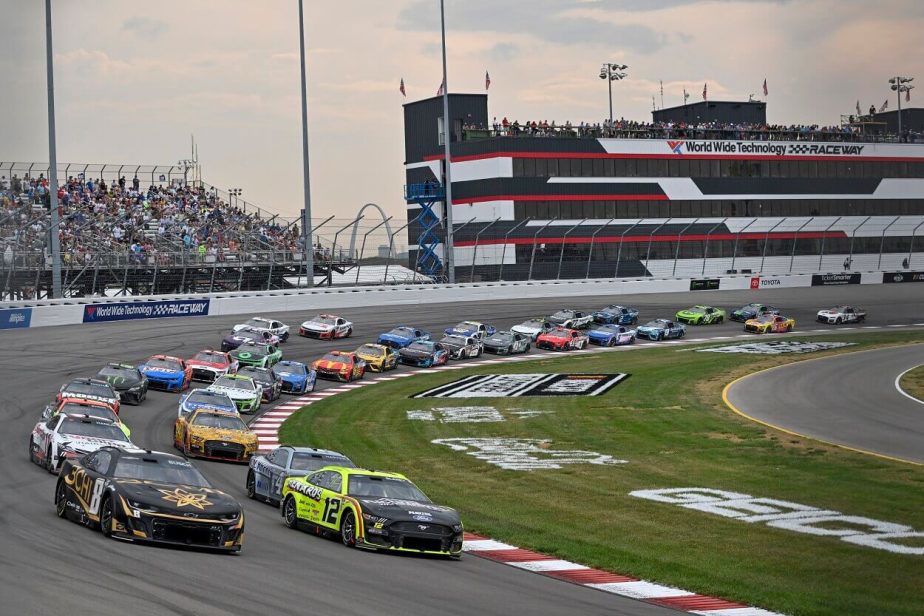
Imago
via Imao

Imago
via Imao
In the early days of NASCAR, race directors were the unseen hands steering the sport’s chaotic energy. These officials, often former drivers or mechanics, wielded immense power from the control tower, making split-second decisions that could make or break a race. Their calls on cautions, penalties, and race restarts were pivotal in shaping the sport’s integrity. For instance, in the 1950s, officials like Herb Nab, a former driver turned race director, were instrumental in enforcing rules that balanced competition and safety.
Watch What’s Trending Now!
But as the sport evolved, so did the scrutiny on those in charge of its fairness. One such race director has been criticized widely over the years. In 2022, he made history as the first Black race director for the Daytona 500, but his tenure was marked by several high-profile decisions that sparked debate among fans and drivers alike. For instance, during the 2025 Duel at Daytona, he called a caution on the final lap, freezing the field just before the finish line. This decision led to Austin Cindric being declared the winner over Erik Jones, despite Jones crossing the line first. And now, NASCAR has finally taken action.
Organizational changes signal a shift in NASCAR operations
NASCAR has parted ways with race director Jusan Hamilton, the governing body confirmed, though it declined to provide further details. Sources indicate the decision was not performance-related. Hamilton’s departure leaves Tim Bermann, the other full-time race director, likely to handle the remaining races of the 2025 season. This move comes amid broader leadership changes at NASCAR, including the upcoming exit of senior executive Chip Wile, who has overseen the sport’s tracks for nearly five years.
Wile, who began his career on the team side with Bill Davis Racing and Turner Motorsports, rose through the ranks to become NASCAR’s first chief track properties officer in early 2021, a role created following the acquisition of ISC speedways.
“What the FRANCE family has done for me and our family is beyond measure. They have changed our life and I am so grateful. But at some point you have to take a step back and say, ‘I’ve got four years left with my boys (before college) and being on an airplane every weekend isn’t what I want to be doing.’ … It’s an honor to work in the sport, but everything in life comes with some sort of sacrifice,” Wile told colleagues, explaining his decision to step down at the end of the 2025 season.
NASCAR has parted ways with race director Jusan Hamilton. NASCAR confirmed he is no longer with the company but would not elaborate. My understanding is the decision was not performance related.
— Bob Pockrass (@bobpockrass) September 26, 2025
During his tenure, Wile had a constant presence in NASCAR’s nearly 10-month-long season, traveling more than 200 days a year to oversee the operations of over a dozen owned and managed tracks. He has played a critical role in modernizing race operations, helping to integrate new venues such as the L.A. Coliseum, city streets in Chicago, and even a naval base near San Diego, while ensuring traditional powerhouses like Daytona, Darlington, Talladega, and Richmond continued to run smoothly. His work has been widely recognized, including being named a 2017 SBJ Forty Under 40 honoree.
Wile’s track record includes leadership roles at some of NASCAR’s most iconic venues. Starting with NASCAR through its Motor Racing Network in 2012, he became the president of Darlington Raceway the following year, where he helped ideate and execute the sport’s first throwback weekend in 2015. By 2016, he took over Daytona International Speedway, replacing Joie Chitwood III, and held that role until April 2021, when he assumed oversight of all NASCAR-owned tracks. Under his guidance, the sport has navigated expansions, experimental events, and logistical challenges with remarkable consistency.
With Wile’s departure, Ben Kennedy will assume oversight of NASCAR’s tracks, stepping into a role that will influence both permanent and experimental race venues. Wile acknowledged the transition with confidence in Kennedy’s abilities, stating, “It’s time. Ben is going to do incredible things for the sport. It’s just time for me to do something else.” As NASCAR navigates these leadership changes, the sport looks to maintain operational excellence while exploring new formats, venues, and fan experience moving into the 2026 season. But along with operational changes, schedule changes might also be underway.
NASCAR eyes return to full-season points amid playoff debate
A collective sigh of relief may be coming for NASCAR fans as the likely return of the Nextel Cup Chase format gains momentum. Mike Forde is clear: “I would be very surprised if the one-race championship is still around.” Following Joey Logano‘s controversial 2024 Cup Championship, which came with the worst average finish in history, the playoff system faced widespread criticism. NASCAR is now seriously considering a return to the full-season points system, last used in 2003, in an attempt to restore balance and fairness.
Discussions have evolved quickly since the Championship Format Committee first met in February. While only one member initially proposed scrapping the playoff entirely, by the September 17 session, multiple key figures supported a return to the traditional points system. Jordan Bianchi told PRN Live, “And I think ultimately, I think you can hit on a championship here that gives everybody a little bit of what they want… Those kind of moments, I think you can still have. I feel like the direction that NASCAR’s headed in is going to be a good balance for that.”
Proposals on the table include adjusting playoff points, increasing the value of wins, and potentially implementing a four-race finale to balance high stakes with season-long achievement. As Mike Ford emphasized, “We don’t want to announce a format prior to Phoenix and then have everyone either devalue this year’s championship or sort of make another set of points of who would be the champion if a new format were in place.” The decision, expected after the championship at Phoenix on November 2, will shape the experience for teams, drivers, and fans for years to come.



